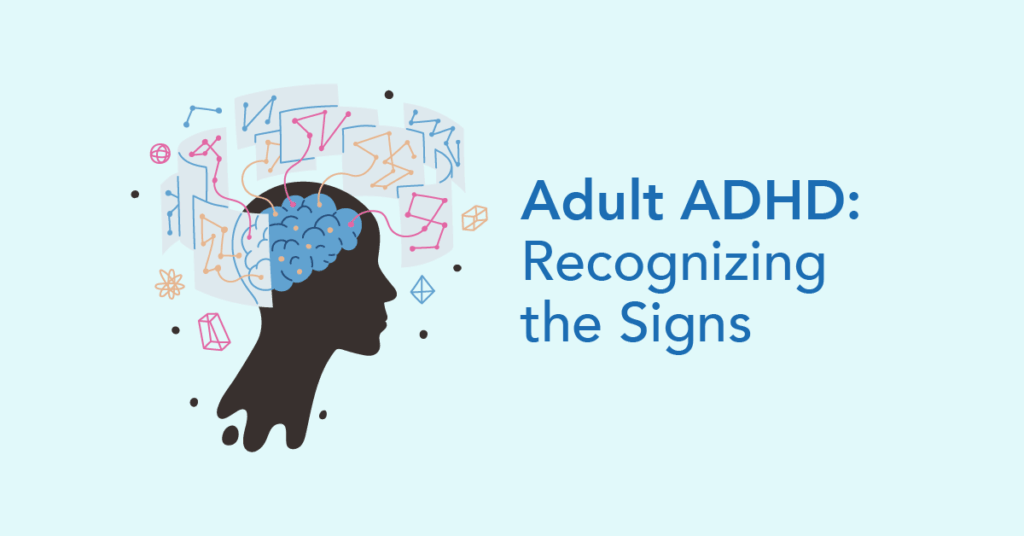Adult ADHD, or attention deficit hyperactivity disorder, is a neurodevelopmental condition affecting focus, impulse control and organization, and it often continues from childhood into adulthood.
Although ADHD is commonly associated with children, it doesn’t disappear with age. In fact, many adults live with ADHD for years before realizing they have it. The symptoms may differ from childhood ADHD and are often misattributed to personality traits, stress or disorganization.
Recognizing the signs is the first step toward getting help, improving daily functioning and finding strategies that work for you.
What Is ADHD in Adults?
ADHD in adults is characterized by persistent patterns of inattention, hyperactivity and impulsivity that interfere with work, relationships and emotional regulation. According to the National Institute of Mental Health, approximately 4.4% of adults in the United States have ADHD, and many remain undiagnosed.
Unlike children with ADHD who may appear hyperactive or disruptive, adults often internalize symptoms or mask them through coping strategies. But untreated ADHD can still lead to significant challenges, including:
- Chronic disorganization
- Missed deadlines
- Trouble maintaining relationships
- Low self-esteem
- Burnout and emotional dysregulation
Key Signs of Adult ADHD
Symptoms of adult ADHD can vary widely, depending on the individual and the type of ADHD they have — inattentive, hyperactive-impulsive or combined. Although not everyone experiences all these symptoms, here are some of the most common signs of ADHD in adults.
Difficulty Focusing or Following Through
Individuals with ADHD may find it hard to concentrate, especially on tasks that are repetitive or not immediately rewarding. This might show up as:
- Starting projects but struggling to finish them
- Zoning out during conversations
- Losing track of tasks or appointments
- Struggling to retain instructions or details
Disorganization and Forgetfulness
Adult ADHD often affects executive functioning — the mental skills responsible for planning, organizing and managing time. This may result in:
- Frequently misplacing items
- Difficulty prioritizing or sticking to a routine
- Having messy workspaces or home environments
- Frequently forgetting meetings, birthdays or obligations
Procrastination and Poor Time Management
People with ADHD may struggle with “time blindness,” making it difficult to estimate how long tasks take or when to start them. This may evidence as:
- Waiting until the last minute to complete tasks
- Overcommitting and underdelivering
- Feeling as though time is always “slipping away”
Emotional Dysregulation
Although it’s not always listed in formal diagnostic criteria, many adults with ADHD report intense emotional swings. As a result, you may display:
- Irritability or low frustration tolerance
- Being overwhelmed by small changes
- Difficulty calming down after an argument
- Emotional outbursts or shutdowns
Impulsivity
Impulsivity can show up as quick decisions, interrupting others or trouble managing finances. Other signs include:
- Blurting things out without thinking
- Difficulty waiting your turn
- Making purchases you later regret
- Frequent job changes or big life shifts without planning
Restlessness and Hyperactivity
In adults, hyperactivity may be less about physical movement and more about internal restlessness. These symptoms may include:
- Feeling constantly “on edge”
- Trouble relaxing or sitting still
- Fidgeting, leg bouncing or tapping
- A need to stay busy or multitask
ADHD Often Hides Behind Coping Strategies
Many adults with undiagnosed ADHD have developed coping mechanisms to manage their symptoms. These might include:
- Overworking to compensate for forgetfulness
- Relying heavily on lists, alarms or sticky notes
- Avoiding tasks requiring sustained attention
- Turning to caffeine, nicotine or even alcohol to self-regulate
While these strategies can help in the short term, they often lead to burnout, anxiety or low self-worth over time.
How Adult ADHD Is Diagnosed
If you suspect you may have ADHD, you should seek a professional evaluation from a:
- Psychiatrist
- Psychologist
- Licensed clinical social worker, or
- Primary care provider familiar with the condition
An evaluation typically includes:
- A clinical interview
- Questionnaires about your symptoms and functioning
- A review of your childhood history (if available)
- Input from people who know you well
A diagnosis can be validating, and it opens the door to targeted treatments.
Treatment Options for Adult ADHD
ADHD is manageable, and many people live fulfilling, successful lives with the right support. Treatment may involve:
Medication
Stimulants (such as Adderall or Ritalin) and non-stimulants (such as Strattera or Wellbutrin) can help regulate chemicals in the brain affecting focus and impulse control. These medications are typically prescribed by a psychiatrist or primary care doctor.
Therapy and Coaching
Therapy and coaching methods used to treat ADHD include:
-
- Cognitive behavioral therapy. CBT helps address negative thought patterns and build coping skills.
- ADHD coaching. This technique focuses on organization, time management and daily functioning.
- Marriage or family therapy. This form of therapy can help improve communication and reduce misunderstandings in relationships.
Lifestyle Changes
Making the following lifestyle changes may help lessen symptoms of ADHD:
-
- Optimize exercise, sleep and nutrition to support brain health.
- Use digital tools such as calendar apps or timers to help with structure.
- Practice mindfulness techniques to improve focus and emotional regulation.
Frequently Asked Questions
- Can ADHD Develop in Adulthood?
ADHD doesn’t typically appear “out of nowhere” in adulthood. Instead, it may go undiagnosed in childhood and become more noticeable when work, school or relationship responsibilities increase. - What’s the Difference Between ADHD and Anxiety?
While the two conditions can overlap, ADHD is rooted in executive dysfunction, while anxiety is driven by excessive worry. Some people have both, which can make diagnosis more complex. - Can You Have ADHD Without Being Hyperactive?
Yes. The inattentive type of ADHD is common in adults, especially women, and it doesn’t include hyperactivity. Symptoms may include mental drifting, forgetfulness and trouble focusing. - Does ADHD Affect Relationships?
It can. Communication breakdowns, impulsivity or forgetfulness can create tension. However, awareness and therapy may help improve relationship dynamics significantly.
When to Reach Out for Help
If any of these signs seem familiar or your daily life seems harder than it should be, you deserve support. Adult ADHD is real, and it’s treatable. Getting evaluated can help bring clarity and open doors to tools that actually work for the way your brain is wired.
The Mental Health Hotline is available 24-7 to help you explore your symptoms, find qualified local providers or get referrals for ADHD testing and treatment. Call us today. Focus, calm and clarity may be closer than you think.


